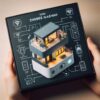Table of Contents
Unlocking the Truth: Are Smart Door Locks a Safe Bet for Home Security?

Introduction to Smart Door Locks
As technology advances, so does the way we secure our homes. Gone are the days of traditional locks and keys, as smart door locks have taken the stage. These innovative devices promise convenience, accessibility, and improved security. But are smart door locks a safe bet for home security? In this article, we will explore the workings of smart door locks, their benefits, potential risks, security features, factors to consider when choosing one, and real-life examples to help you make an informed decision.
How Do Smart Door Locks Work?
Smart door locks are designed to provide keyless access to your home. They utilize a combination of wireless technology, such as Bluetooth, Wi-Fi, or Z-Wave, and encryption to communicate with your smartphone, tablet, or a central hub. This allows you to control and monitor your door lock remotely. Some smart locks also offer additional features, like voice control or integration with virtual assistants such as Amazon Alexa or Google Assistant.
When you approach your door, the smart lock can automatically detect your smartphone’s presence and unlock the door for you, eliminating the need for physical keys. Alternatively, you can use a keypad, fingerprint recognition, or even a traditional key to unlock the door. The lock’s software can be accessed through a mobile app, allowing you to grant temporary access to guests, receive notifications of door activity, and track who enters and exits your home.
Benefits of Smart Door Locks
Smart door locks offer a range of benefits that make them an attractive option for homeowners. First and foremost, they provide convenience. No more fumbling for keys or worrying about forgotten keys; your smartphone becomes your digital key, always with you and easily accessible. Additionally, smart locks allow for remote control, enabling you to lock or unlock your door from anywhere, granting access to service providers or family members when you’re not at home.
Another advantage of Smart Home Locks is enhanced security. Traditional locks can be easily picked or bumped, but smart locks offer advanced encryption and authentication methods, making them more resistant to unauthorized access. Moreover, their ability to send real-time notifications ensures you’re always aware of who enters or exits your home, adding an extra layer of security and peace of mind.
Potential Risks and Concerns of Smart Door Locks
While smart door locks offer numerous benefits, they also come with potential risks and concerns that should be taken into consideration. One primary concern is the reliance on technology. Like any electronic device, smart locks can experience malfunctions, software bugs, or vulnerabilities that hackers can exploit. A malfunction could potentially lock you out of your home, or a security vulnerability could compromise the lock’s integrity.
Another concern is the potential for unauthorized access. Wi-Fi Door locks rely on wireless communication, which can be susceptible to interception or hacking attempts. If a hacker gains access to your lock’s credentials, they could potentially unlock your door without your knowledge. To mitigate this risk, it’s crucial to choose a smart lock from a reputable manufacturer that regularly updates its firmware to address security vulnerabilities.
Security Features of Smart Door Locks
To ensure the safety of your home, smart door locks incorporate various security features. One common security measure is two-factor authentication, requiring both a physical credential (such as a fingerprint or PIN) and a digital credential (like a smartphone or key fob) to unlock the door. This adds an extra layer of protection against unauthorized access.
Many smart locks also use advanced encryption algorithms to secure the communication between the lock and your mobile device or hub. This prevents eavesdropping or tampering with the signal. Additionally, some models offer tamper detection, which alerts you if someone tries to force the lock open or tamper with it in any way.
Factors to Consider When Choosing a Smart Door Lock
When selecting a smart door lock, there are several factors to consider to ensure you choose the right one for your needs. First, compatibility with your existing door and lock mechanism is crucial. Check the lock’s specifications to ensure it can fit your door and understand if any modifications are required.
Next, evaluate the connectivity options that the smart lock supports. Bluetooth-only locks have limited range, whereas Wi-Fi-enabled locks allow for remote control from anywhere with an internet connection. Consider which connectivity option aligns with your preferences and requirements.
Another factor to consider is the power source. Smart locks can be battery-operated or hardwired. Battery-operated locks provide flexibility but require regular battery replacement, while hardwired locks offer a continuous power source but may require professional installation.
Are Smart Door Locks Safe?
The safety of smart door locks ultimately depends on various factors, including the manufacturer’s reputation, the lock’s security features, and your own security practices. Reputable manufacturers invest in rigorous testing and security measures to ensure their products are robust and difficult to breach.
To maximize the safety of your smart door lock, follow best practices such as regularly updating the lock’s firmware, using strong and unique passwords for your lock’s app, and enabling two-factor authentication whenever possible. By implementing these measures and choosing a trusted smart lock, you can significantly reduce the risks associated with smart door lock security.
Case Studies and Real-Life Examples of Smart Door Lock Security
Real-life examples can provide valuable insights into the effectiveness and security of smart door locks. For instance, a homeowner in a high-crime area installed a smart door lock with advanced security features. The lock’s tamper detection alerted the homeowner to an attempted break-in, and the lock’s robust encryption prevented the intruder from gaining access.
In another case, a family used a smart door lock to grant temporary access to a house cleaner while they were away. The lock’s mobile app allowed them to monitor the cleaner’s entry and exit times, ensuring the job was completed as agreed upon. These examples demonstrate how Smart Home Locks can enhance home security and provide peace of mind.
Tips for Improving Smart Door Lock Security
While smart door locks offer enhanced security, there are additional steps you can take to further improve their safety. Firstly, regularly check for firmware updates from the lock’s manufacturer and promptly install them. These updates often include security patches that address any vulnerabilities discovered.
Secondly, secure your mobile device with a strong password, PIN, or biometric authentication. Since your smartphone acts as the digital key, it’s crucial to protect it from unauthorized access. Additionally, consider enabling remote lockout or timeout features, allowing you to remotely lock your smart lock in case of a lost or stolen device.
Conclusion: Weighing the Pros and Cons of Smart Door Locks for Home Security
In conclusion, smart door locks offer a modern and convenient approach to home security. They provide numerous benefits, including keyless entry, remote control, and real-time notifications. However, like any technology, they come with potential risks and concerns that should not be overlooked.
By considering the security features, choosing a reputable manufacturer, and implementing best practices, you can minimize the risks associated with smart door locks. Ultimately, the decision to invest in a smart door lock should be based on your own needs, preferences, and level of comfort with the technology. With the right precautions in place, smart door locks can be a safe and effective solution for enhancing your home security.
Ready to take your home security to the next level? Explore the wide range of smart door locks available today and make an informed choice for your home’s safety.






